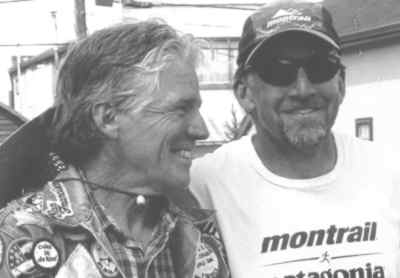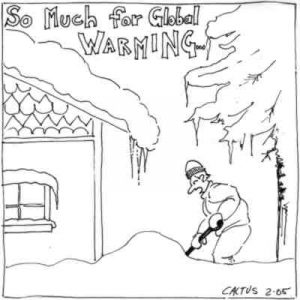Column by Hal Walter
Local Legends – February 2005 – Colorado Central Magazine
CURTIS IMRIE DIED in a spectacular automobile accident New Year’s Day, 2005 — just ask him.
Following are the facts as supplied by the 57-year-old “deceased,” well known in Central Colorado circles for making somewhat quixotic (although the image of a squire on a mule is somewhat fitting, my dictionary defines this word as meaning “extravagantly idealistic”) runs at public office, winning the World Championship pack-burro race three times, and producing artsy independent films. He has also been a friend of mine for nigh on 25 years.
Curtis spent the Christmas holiday with his mother, Mary, in the Chicago area (his father Walter passed on last summer). On New Year’s Eve, Curtis flew in to DIA, and since it was “amateur night” decided against driving home to 4 Elk near Buena Vista. Instead, he stayed in Aurora with friend and former Leadville resident Neal McGowan.
The next afternoon he gassed up his black 1985 Pontiac Fiero, the only car he ever owned new — he received it by way of payment for a television commercial he starred in — and headed out on I-70. “I could see the stock show complex and the misty mountains in the background,” says Curtis. “I was feeling good, and happy to be in the slow lane.”
But somewhere just west of the I-225 interchange, Curtis’s world went black as an 18-wheel semi-tractor rig changed lanes right over the top of his low-slung car. “Kapowee…! Just this incredible blow, an explosive blow,” recalls Curtis. “Everything just goes dark; imploding glass and plastic all around.”
The Fiero was wedged under the trailer part of the semi, against the rear axle, and was being dragged along at highway speeds for what Curtis says was the better part of a mile.
“It was like a bad movie stunt, and because of my (film) training there is something about the dreamlike state, the trance, and the way that violence is rendered on the big screen — it’s not like that at all when you’re looking at your own death.”
And while the actual wheels of his sports car were being ground flat on the pavement, the semi’s under carriage was starting to come over the top of the car. The Fiero has a built-in roll bar, and this was the only thing holding the car upright and together. Otherwise we’re basically talking about an oversized Tupperware bowl with four wheels.
“The real memory of it was endless smoke and dust, and the sense of a huge tire or wheel coming into my lap,” says Curtis “There was this groaning and this almost underwater sense like something out of a submarine movie. And what was endless was this speeding up and slowing down as I was trying to figure out how to get out of it.”
“Then something in my reptilian brain said ‘no, I ain’t going to be a victim.'” Curtis hit the wheel hard right and the entire car shot out from under the semi trailer like the biblical Jonah being spit out by the whale.
“Everything suddenly stopped and all of a sudden it’s light and I’m hanging on this barrier with the car almost perpendicular to the pavement … I unstrapped the seatbelt, turned the engine off,” recalls Curtis. “I dropped through what was left of the window and fell to my knees on the pavement.”

IT WAS THEN that Curtis realized fully what had happened, that he was miraculously uninjured and on the pullover barrier of the interstate. “I could see people running toward me, a truck pulled off to the west, and that I had died, but frankly I was reborn.”
The driver of the semi had pulled over, apparently alerted by other motorists and thinking that perhaps he had a flat tire or something. Curtis says the driver was later cited for “Improper Lane Change,” an amazing fact when you consider that vehicular homicide was not out of the realm of possibilities.
But then, maybe that’s appropriate. “I died in that wreck,” Curtis insists in a strange twist on the Twainism in which the famous author once said rumors of his demise were “an exaggeration.” But Curtis means this in a more literary, or philosophical sense, noting that his near-death experience made him “reborn.” Those of us who know him well know this will not likely transgress to “born again” as it does with so many people who live through these sorts of events.
SO WHILE MOST PEOPLE were making New Year’s Resolutions to lose weight, quit smoking and other banalities that will soon fall by the wayside, Curtis was truly on the highway to renewal. He noted that facing death was not frightening. “In fact, there’s really nothing to be afraid of.” Moreover, he says the experience gave him affirmation of the way he’s lived his life so far, and the way he intends to live his new life to the literal end.
“I did die in that crash,” Curtis says. “I was reborn and I hope I can maintain this state of transformation … and continue to do good work in the face of overwhelming odds.”
As I mentioned, I’ve known Curtis Imrie for a quarter century. He introduced me to the sport of pack-burro racing, and also the notion of having a real life instead of being what has been described as “bung fodder for the economy.” He’s had a tremendous impact on my life and my writing, and I admire his ideals while recognizing and forgiving his occasional inconsistency. Recently I reflected upon the largely autobiographical parallels in what he and I would call our “art” — his films and my writing. The most apparent differences are the mediums, and that Curtis tends to straddle the barbed-wire fence between real and surreal, while my essays are purely non-fiction, or personal journalism.
And thus I wonder what path this “rebirth” will lead to next. Curtis is already talking about fighting the insurance racketeers over the totaled Fiero and rebuilding the thing. He’s located a red ’85 chassis and is battling the powers that be over recovering the motor and other usable parts from his wrecked auto. “It’ll require some new wheels and things but if they are going to f— me I’d at least like to have a decent run-around car,” he says.
Part of me would rather see Curtis focus his efforts on suing the trucking company, buying a new car and perhaps sharing some of the proceeds with friends. But to get back to his near-death experience he sums it up this way: “It makes you different, it really does.”
Well, yeah, or maybe not. Either way, I’m glad rumors of Curtis’ demise are only figurative.
Stories like Curtis Imrie’s are the reason writer Hal Walter seldom strays from the Wet Mountains to the Front Strange Clusterplex.



